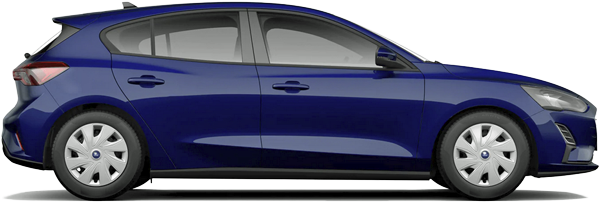Die Vergleichsanalyse :
Ford Focus 2.0 EcoBlue (18 - ..) vs. VW Golf 1.0 TSI BMT (17 - 18)
28.100 €

20.800 €

28.100 €
Grundpreis ⓘListenpreis für das Basismodell (Standardausstattung ohne Extras) zum Zeitpunkt der Markteinführung in Deutschland.
20.800 €
ⓘListenpreis für das Basismodell (Standardausstattung ohne Extras) zum Zeitpunkt der Markteinführung in Deutschland. Preisinfo
Abmessungen
Die Abmessungen dieser Fahrzeuge unterscheiden sich etwas voneinander. Der Ford Focus 2.0 EcoBlue ist 12 cm länger, 2.6 cm breiter und 4 cm niedriger als der VW Golf 1.0 TSI BMT.
Ford Focus 2.0 EcoBlue
VW Golf 1.0 TSI BMT
1452
1825
1979
1492
1799
2027
1825 mm
Breite
1799 mm
1979 mm
Breite mit Spiegeln
2027 mm
1452 mm
Höhe
1492 mm
2700
4378
2620
4258
4378 mm
Länge
4258 mm
2700 mm
Radstand
2620 mm
Gewicht
Ford Focus 2.0 EcoBlue
VW Golf 1.0 TSI BMT
1493 kg
Leergewicht
1216 kg
2020 kg
Zulässiges
Gesamtgewicht
Gesamtgewicht
1720 kg

Gewichtsdifferenz:
277 kg
18.55 %

Allgemein
Ford Focus 2.0 EcoBlue
VW Golf 1.0 TSI BMT
DEH
Baureihe
AU
Schrägheck
Karosserie
Schrägheck
Diesel
Kraftstoff
Super (ROZ 95)

Frontantrieb
Antrieb
Frontantrieb

6-Gang-Schaltgetriebe
Getriebe
6-Gang-Schaltgetriebe
Motor
Ford Focus 2.0 EcoBlue
VW Golf 1.0 TSI BMT
Reihenvierzylinder-Diesel mit Turboaufladung
Motorbauart
Reihendreizylinder-Benziner mit Turboaufladung
Motorcode
*CHZ*
4
Ventile
4
4
Zylinder
3
1995 cm³
Hubraum
999 cm³
150 PS
bei 3500 U/min
Leistung
110 PS
bei 5000 U/min
Ford Focus 2.0 EcoBlue
150 PS
110 PS
VW Golf 1.0 TSI BMT
370 Nm
bei 2000 U/min
Drehmoment
200 Nm
bei 2000 U/min
Ford Focus 2.0 EcoBlue
370 Nm
200 Nm
VW Golf 1.0 TSI BMT
Leistungsfähigkeit
Ford Focus 2.0 EcoBlue
VW Golf 1.0 TSI BMT
210 km/h
Höchstgeschwindigkeit
196 km/h
8.5 s
Beschleunigung 0 – 100 km/h
9.9 s
100 km/h
100
km/h
km/h
118 m
0.000 s

Ford Focus 2.0 EcoBlue
100 km/h
100
km/h
km/h
138 m
0.000 s

VW Golf 1.0 TSI BMT
▶ REPLAY
9.95 kg/PS
Leistungsgewicht
11.05 kg/PS
Ford Focus 2.0 EcoBlue
9.95 kg/PS
11.05 kg/PS
VW Golf 1.0 TSI BMT
Verbrauch / Umwelt
Ford Focus 2.0 EcoBlue
VW Golf 1.0 TSI BMT
Verbrauch pro 100 km
4.4 L
kombiniert
4.8 L
Ford Focus 2.0 EcoBlue
4.4 L
4.8 L
VW Golf 1.0 TSI BMT
5.6 L
innerorts
5.9 L
3.6 L
außerorts
4.1 L
47 L
Tankgröße
50 L
1068 km
Reichweite
1042 km
Ford Focus 2.0 EcoBlue
1068 km
1042 km
VW Golf 1.0 TSI BMT
Auswirkung auf die Umwelt
56.2 kWh
Gesamtenergieverbrauch
pro 100 km ⓘDer Gesamtenergieverbrauch pro 100 km ergibt sich aus der Energie, die ein Fahrzeug bei der Verbrennung eines Treibstoffs (bzw. bei der Verwendung von Strom) pro 100 km verbraucht (Endenergie) und der Energie, die für die Erzeugung und Bereitstellung entsprechender Menge Treibstoffs (bzw. Stroms) benötigt wird (Primärenergie). Dabei werden auch die Vorprozesse der Treibstoffherstellung, der Transport eines Treibstoffs bis zur Tankstelle (bzw. der Transport des Stroms bis zur Steckdose) und die Verluste, die dabei auftreten, berücksichtigt. Der Gesamtenergieverbrauch ermöglicht somit einen Vergleich der Energieeffizienz von Fahrzeugen mit verschiedenen Antriebssystemen.
pro 100 km ⓘDer Gesamtenergieverbrauch pro 100 km ergibt sich aus der Energie, die ein Fahrzeug bei der Verbrennung eines Treibstoffs (bzw. bei der Verwendung von Strom) pro 100 km verbraucht (Endenergie) und der Energie, die für die Erzeugung und Bereitstellung entsprechender Menge Treibstoffs (bzw. Stroms) benötigt wird (Primärenergie). Dabei werden auch die Vorprozesse der Treibstoffherstellung, der Transport eines Treibstoffs bis zur Tankstelle (bzw. der Transport des Stroms bis zur Steckdose) und die Verluste, die dabei auftreten, berücksichtigt. Der Gesamtenergieverbrauch ermöglicht somit einen Vergleich der Energieeffizienz von Fahrzeugen mit verschiedenen Antriebssystemen.
56.5 kWh
Ford Focus 2.0 EcoBlue
56.2 kWh
56.5 kWh
VW Golf 1.0 TSI BMT
Euro 6d-TEMP (WLTP) 36AG-AI
Schadstoffklasse
Euro 6b (NEFZ)
128 g/km (WLTP)
CO2-Emissionen
109 g/km (NEFZ)
Alltagsnutzen
Ford Focus 2.0 EcoBlue
VW Golf 1.0 TSI BMT
5
Türen
5
5
Sitzplätze
5
527 kg
Maximale Zuladung
504 kg
341 L
Kofferraumvolumen
380 L







1320 L
Stauraum mit umgeklappter
Rücksitzbank
Rücksitzbank
1270 L



















